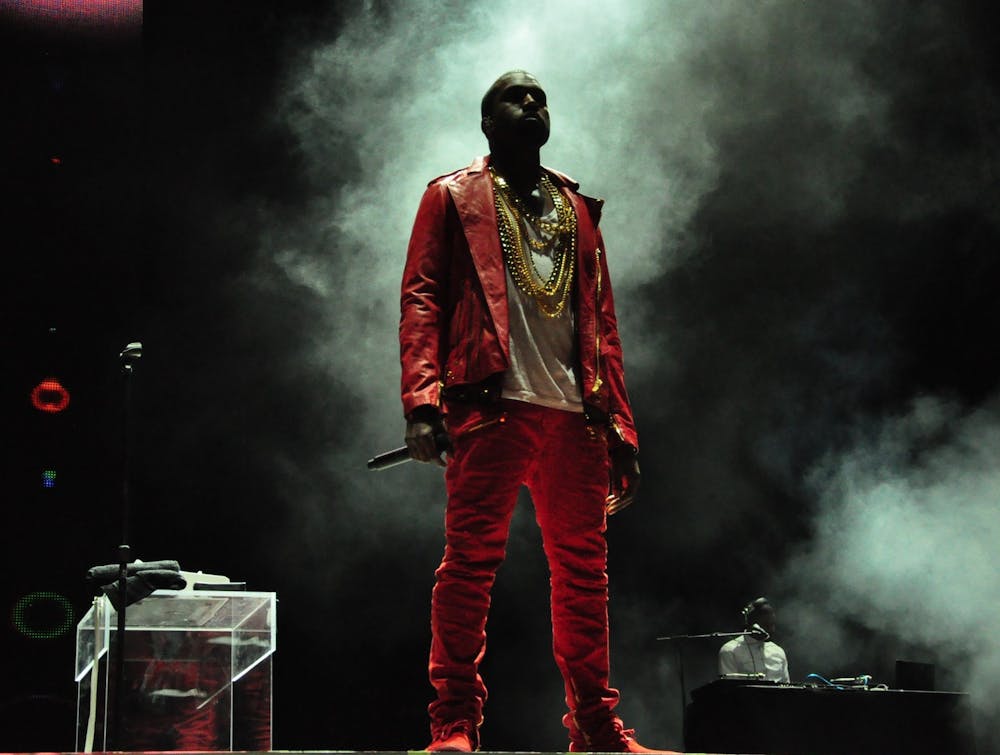On Wednesday, Feb. 16, the first installment of jeen-yuhs, Netflix’s three-part documentary about Kanye West, was released. Titled “act i: VISION,” the film curates an image of the American Dream seen through West’s relentless perseverance to make it in the music industry and his first taste of success.
The documentary opens with West rapping and making questionable decisions on Twitter in 2020. The cold opening orients the viewer to think critically about the consequences of the relentless upward trend of West’s fame and success. A slew of flashback photos and videos follows, overdubbed with statements of voiced judgements about West’s ego.
With a reminder that there are sinister sides to the larger-than-life figure, the filmmakers bring the audience back to West’s humble beginnings. Clarence “Coodie” Simmons, one of the directors of the documentary, uses his voice to narrate the project. He explains his place within West’s narrative as a friend and as someone who provided valuable assistance to West’s career by capturing the artist with a camera. The filmmaker’s choice to insert himself into the narration grounds the documentary, allowing the audience to see a more relaxed, non-performative West interacting with a friend.
The filmmakers crafted a well-developed arc for the first episode, following West’s fight to be seen as more than a producer and to get signed by a record label. Coodie’s ever-moving camerawork and quick edits mirror the energy inherent in West’s constant attempts to be seen by those with the power to give him major opportunities. He carves out opportunities for himself with pure talent and a hefty amount of self-confidence.
The film skillfully balances the depiction of West’s musical ambitions and his personal life. Halfway through the documentary, West travels back to his home in Chicago to attend a music conference hosted by Chicago’s top radio station WGCI. There, West’s friend Dug Infinite calls him out on the radio station, and West deals with the situation publicly and in private.
Shocked by the behavior of his friend, West returns home to visit his mother, Donda West. This moment is the most tender in the first installment. Coodie’s narration takes a backseat to this interaction, as West’s mother commands attention. She shares valuable wisdom with West by saying, “Giants look in the mirror and see nothing,” urging him to remain humble and grounded, even in the face of immense success.
Music drives the documentary forward. Before getting signed, West plays demos of his now well-known songs for different record labels — by barging into their offices — and for other prominent rappers like Scarface. There is an inherent excitement for what is to come, though also lingering anxiety for his future actions.
The documentary’s release coincided with West’s domineering prominence in the pop culture scene, with his public display of distress surrounding his divorce from Kim Kardashian. The show ferments in tragedy due to the painful nature of witnessing West’s erratic behavior nestled in the current cultural context.
West is inarguably successful. The documentary displays a version of West’s story that is very linear. Through perseverance and merit, he was destined to achieve his dreams. However, the nature of dreams is that they are illusory. The future, too, is unknowable. Coodie and co-director Chike Ozah develop a clean story out of the past through the lens of the future, utilizing dramatic irony to drive viewership. This documentary is just one puzzle piece in West’s idiosyncratic narrative.
This documentary highlights the importance of self-assurance and hard work; the film makes it look relatively straightforward. However, many Americans know the struggle of achieving recognition as an artist, and many have not been so lucky. Arguably, many Americans are not as talented as West. Achieving success is not the step-by-step process that the documentary seems to depict.
Like West, as a society, we have become excellent storytellers. We write resumes, hand out business cards, make Instagram posts and design websites to craft our personal narratives, hoping that someone will recognize our greatness. West believed in his own greatness first, so maybe that is the first step to success. Platitudes, though, will not save us all, and the American Dream is not as simple as jeen-yuhs makes it seem.





